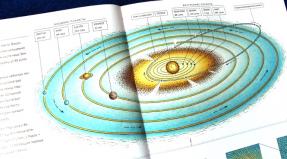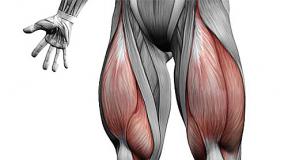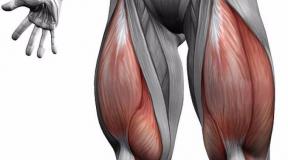What should an economist know? What should an economist know and be able to do?
Hello dear readers!
In this article, I will return to the topic of developing a way of thinking, which I started in one of the previous ones.
If you have thought about what was written earlier, made the appropriate conclusions, and the thought “I must start developing!” is firmly entrenched in your head, then I congratulate you from the bottom of my heart - you have chosen the right path.
I talked about how important it is to remove restrictions from yourself, to believe in yourself, in your potential for learning and knowledge.
However, you should not feed yourself with illusions that this path is simple, straightforward, sunny and friendly - this is not at all the case. There are a lot of stones, obstacles, forks and imaginary paths leading you to a dead end or completely leading you off the right path. However, it is still much better than standing still! I think it's obvious.
So, you made a decision, got on the right path and moved forward. In this article I will tell you where to start, what knowledge you need to get first of all, so that further study is easier. You may be surprised, but such knowledge is knowledge from the course "Fundamentals of Economics"
Let's start simple. Let's do a question-and-answer argument (we already know how to do this, right?). So what are we doing? We are studying internet business. For what purpose? For making money. What is business in general? In your own words, you can say this: this is an activity that brings money. Is always? Probably not.
What business is making money? And what is money anyway? Well, we know, yes, such pieces of paper that can be exchanged for a product or service. And where do they come from? How do they work? Why can't they just be printed on a printer? Why do some people have a lot of them, and some do not have at all? Why, for example, for a dollar can I buy almost anything and anywhere, but for a ruble - only something small (relatively) and only within the Russian Federation?
Well, we received a bunch of questions and remember that this is good, it means that the “question-answer” works and our brain cooks. Now, where to get answers to all these questions? I answer: business, types of business organization, money, types of money, functions of money - this is only part of the basic economic concepts. Therefore, any student who has completed the first year of the Faculty of Economics knows the answers to them (well, a conscientious student).
I have no economic education, but I can say with confidence that the entire economics course can be divided into two parts: the basics of economics and special economic knowledge.
Secondly, I myself am not strong, and there is no need for this. They teach accounting, legal regulation and other things that are needed only directly by economists, lawyers, statisticians, accountants and other specialists working at the enterprise.
There is absolutely no need for a businessman to fill his head with all this, he is able to hire such a specialist and he will work for him, receive his salary and bonuses and enjoy life and the fact that he knows it so well and he is paid for his knowledge.
However, any leader must know the basics of economics (and, of course, management, but this is not about that now), because without this knowledge he simply will not imagine what his business will do, how he will do it, for what and for whom.

Now we looked at the economy from the side of business, that is, the enterprise. However, there is another side - ordinary people. We are all part of the economy, because every day we sell something, buy something, enter into some kind of relationship (even if it's a simple exchange of movie discs with your neighbor or friend).
To characterize each of us, the economy uses the concept of "household". It can be one person, a family with a shared budget, you and a friend who decide to work together, whatever. The important thing is that you interact with other households, businesses (directly or through intermediaries - sellers), organizations and so on.
That is, in fact, the economy is our life. Almost everything we do is directly or indirectly related to certain economic processes or phenomena. It is for this reason that I advise everyone and everyone to know the basics of economics.
Having received basic economic knowledge, you will begin to look at the world in a completely different way, answer a bunch of questions that may have haunted you once or still haunt you, and, perhaps, you will already clearly determine what you worth doing in this life.
You will learn how to compare types of earnings and choose the best one (I give a hint: the best is earnings on the Internet, but here's why - I want you to find out for yourself).
In addition, knowing how this or that organization (bank, stock exchange, fund, and others) works, it will be easier for you to interact with them if necessary, and you will more easily come to an agreement with them that is beneficial for both of you, and you will also be more protected from offenses and fraudulent and deceptive actions in your direction.
So, I hope I conveyed to you how important it is to know and understand the basics of economics not only for a businessman, accountant, banker or economics student, but in principle for any person, wherever he lives and whatever he does.
Now let's get straight to the point. On the Internet, you can find a huge amount of literature on topics that interest you. Look for textbooks with the following titles: Fundamentals of Economics, Economic Theory, Political Economy.
If you are interested in my opinion, then I recommend the textbook "Fundamentals of Economics" by Evgeny Borisov (2002).
Of course, I recommend reading the entire textbook, nothing that is written there will be superfluous for you, believe me. However, there are a number of issues and points that you need to pay priority attention to. I present to you a list of them:
- Economics as a science. The subject of economics. Object and subjects of the economy.
- History of the economy: the main stages of the transformation of economic systems, the impact on the world economy of the industrial revolution (XVII-XVIII centuries) and the scientific and technological revolution (mid-XX century) (this is not in Evgeny Borisov's textbook, look in other sources).
- Own. Kinds and types of property.
- Company. Types of enterprises. Fundamentals of enterprise economics.
- Monopoly and competition.
- Consumers. Households.
- Market. Supply and demand. Market price and market equilibrium.
- factors of production. Capital. Types of capital. capital income.
- Country as an economic system. Indicators of the economic development of the country. The role of the state in the country's economy.
- Banks. Functions of banks. Banking system. The role of banks in the country's economy.
- Essence and functions of money. Monetary systems. National and international currency. National currency rate. Inflation. History of money.
I consider the last question to be especially interesting and informative, and also, of course, the most important. I will even recommend a separate textbook on it - Anatoly Shchetinin "Money and Credit". The textbook is in Ukrainian, so if you don't speak Ukrainian, look for an alternative.
And in general, learn as much as possible about money, the more you know about them, the more they will love you.

Of course, I do not force you to study all this in a week or by the time my new article is published. The same students of the Faculty of Economics have been studying this for more than one year (and some, even after receiving a diploma, cannot clearly explain why, for example, the national currency has grown).
But gradually, allocating no more than 20-30 minutes a day, you will gain the knowledge you need, and it will become much easier to study the operation of various Internet systems. In addition, as I said, economics is a science all around us, and therefore, you may already know much of what you read about.
However, a complete study of the course of economic fundamentals will help you connect and systematize the knowledge that you already have, draw logical chains and thereby consolidate and understand even better what you just heard or read somewhere.
And, of course, do not forget about the literature, which I talked about in the previous article.
Well, I wish you good luck and see you soon!
Sincerely, !
An economist is a person who talks about incomprehensible
things to him in such a way that you feel ignorant"
Herbert Proknow
Economics is traditionally one of the most popular areas of study in Russian universities. IQ Review will tell you what the profession of an "economist" is, how it differs from working as an accountant, and how much they pay for it. Natalya, an economist with five years of experience, shared her story.
Why I chose the profession of an economist
I live in the Kastorensky district of the Kursk region. worked for 5 years, started working after graduating from the 3rd year of the institute.
Why does a company need an economist?
Many people think that the profession is akin to the profession of an accountant. After all, both of them work with figures relating to the work of the organization, its profitability and results.
The difference between an economist and an accountant is that the accountant actually collects and organizes the documentation and its contents, while the economist must analyze and evaluate the results of work for a specific period, identify shortcomings and, based on what happened, make a forecast.
Yes, yes, an economist is a kind of predictor based on facts.
What you need to know to work as an economist
First of all, working as an economist implies close communication with numbers, formulas and all sorts of ratios. Therefore, knowledge of mathematics and its foundations is required. Anyone who is not able to find the percentage of a given number simply has nothing to do in this area. It is desirable, or rather, even necessary, that a person has an analytical mindset. Indeed, on the basis of the derived data, it is necessary to assess the current situation at the enterprise and submit a report to the manager.
An example of work is to prove which of the selected areas of activity is profitable, and which project should be suspended or completely closed.
Now in the vast majority of specialized higher educational institutions, technical schools and colleges there are faculties that train economists. This is due to the fact that the profession is very popular among young people. The university I graduated from has an agricultural focus. From the first to the third year, we studied subjects that all competent and educated agricultural workers should know. I will not list everything, but among them were crop production, animal husbandry, philosophy, mechanization and others.
At first we did not understand why we need, say, mechanization. But in senior years, when in statistics or economics of the enterprise they began to ask us tasks for calculating fuel consumption, seed yield or livestock productivity, in which it was necessary to derive profitability and projected profit, everything fell into place.
The essence of the profession of an economist is to know the bottom line of the enterprise, every “cog” that can be “screwed” into the system in order to increase returns.
And, of course, in modern conditions, every specialist should know the computer. And not at the user level. An advanced user of Microsoft Office programs is the minimum of what is needed for work, usually knowledge of 1C products is also required.
How to find a job as a beginner economist
Getting a job as an economist, especially from scratch, without work experience, is very difficult, almost impossible. This requires a case. Newcomers can get this job in an alternative way - to start working at the enterprise in a different position, while simultaneously studying at a university with a degree in economics. The management will definitely notice the employee's desire for improvement and, at the first opportunity, will provide the desired position.
Usually, managers, accepting newcomers for this position, do not make serious demands. They ask to present a diploma of education and ask a few questions about the knowledge in the area in which the company operates. Will the candidate cope with his duties or not, it remains to be seen during the probationary period. For all employees, this is three months; for management personnel, the period can be extended to six months. At this time, the management of the enterprise may decide to dismiss the employee due to the fact that he does not cope with his duties. Therefore, except for lost time, the director of the enterprise does not risk anything in this situation.
The main thing that managers pay special attention to when hiring for any position is the goodwill, the correct staging of speech and the sociability of the applicant. In particular, in the provinces, where everyone knows everything about each other, usually the authorities make inquiries about a person.
How I found a job - personal experience
From personal experience, I can say that I read an advertisement in a local newspaper that a trading company needed an economist. Having plucked up the impudence, since I had only completed the third year at the institute by profession, I came to the director and stated that I knew nothing about my work, but I was burning with the desire to work in this particular area and in this position. I must say that I worked as a seller for a long time, so I imagined the “kitchen” of a trading enterprise. This was also mentioned. I don’t know what was the decisive factor, but two days later the director called me back and invited me to come with the documents to be processed at the company’s office.
Functional responsibilities of an economist at the enterprise
A few words about what an economist should do at his workplace every day. First you need to describe the company itself a little. This is a link of a network company, well-known in Russia, which specializes in retail trade in first-demand goods (food, household group, furniture, toys and stationery). The structure of the organization, which was managed by 6 people, included 30 rural shops.
The first thing I started my activity with was compiling the daily turnover in the context of each store. For this, there was a special notebook, which was lined by hand, where the list of stores was located horizontally, and the amounts of daily revenue handed over by each outlet were entered vertically. The amounts were selected from the 1C program with a cumulative total. As a result, at the end of the month, the result of the work of the enterprise was visible in the form of a total amount and the result of the work of each store and its turnover. This concept hides the number of days required to sell the average stock of goods in a store. The average inventory for the period is divided by the average one-day turnover of the outlet.
At the end of each month, in a special tablet made in the Excel editor, a comparative analysis of the work of each outlet was carried out in comparison with the previous month and the same period last year. This made it possible to analyze the work of the enterprise as a whole and for each department. In the same way, costs and expenses were analyzed. I made similar forms to analyze the cost of electricity, repair of premises, gas supply, wages and deductions, the amount of the balance of goods in stores.
The number of reports that I was responsible for compiling is difficult to calculate. The main three were sent monthly to the head office located in the city of Kursk, and included all the indicators that the company achieved over the past month. Every month a report was made to the Statistical Office which included the same data. In addition, quarterly and annual performance reports were submitted for the quarter and year.
By the end of the quarter, I was developing a plan for each outlet for the next three months. Planning was based on a comparative analysis of similar periods of the past three years and the last quarter.
By all rights, the plan for the outlet should be directly linked to the population living in the village where the store operates, but this is a real problem. Information about residents is collected by calling the village administrations, and they have one thing in their papers, but in reality it is completely different. They give information only about registered citizens who, perhaps, have not lived there for many years, and those who came to work and live without a residence permit are simply not taken into account.
Therefore, my method was the most optimal. In January of each year, a tentative plan for the coming year was drawn up. It was based on the figures presented to us by the parent company and the capabilities of each store.
How much do economists earn
It is difficult for me to talk about how much people of my profession earn in big cities, but for our area my salary was considered quite good. My salary was 16,000 rubles. Minus this figure, income tax of 13% and trade union dues, about 14,500 rubles a month came into hand. Wages were paid officially, with all necessary deductions. The social package was represented only by sick pay and gifts for children for the New Year holidays - not the scale of an enterprise where there are free trips to the sea or their own children's camps.
According to the statistics that I was interested in, the minimum salary of an economist in a large city starts at 22,000 rubles, and its upper limit is 80,000 rubles. But in order to earn so much, you need to have extensive work experience in this specialty, and besides, you need to live in the city.
Pros and cons of being an economist
The advantages of the profession include the fact that an economist is an employee independent of anyone except the director. In addition, people who have decided to devote themselves to this profession are individuals who put a creative approach to activity at the forefront. The opportunity to see what others cannot see, to improve the structure and staffing in order to direct efforts towards achieving the set goals - this is really interesting.
I do not see any shortcomings in this work. The only negative characteristic of the vast majority of enterprises in our time is to load the one who copes with their duties with the maximum number of additional functions that distract from the main process.
What does it take to be appreciated and noticed?
In my case, only the chief accountant and director of the organization were above me in rank. Accounting is not mine! And there was no desire to become a leader. No, I do not want to say that I am not ambitious! Very much! But this is not the case. Our director had so many responsibilities and problems that sometimes it seemed to me that he spent the night in the office. The enterprise, which he inherited from his predecessor, was in a state of extreme decline. And he didn't even have time to breathe.
I occupied a good position, I really liked my work, and I did not want to change anything. In addition, not having much experience and experience, I tried to travel to neighboring branches of the parent organization to experienced economists, where I learned a lot. Several times I was sent to advanced training courses, after which I was entrusted with work with personnel.
Parting words for beginners
The most important thing in our profession, as in any other, is to remain human. Attention to details and numbers, perseverance and literacy are the qualities that must be present. It is advisable, if the opportunity presents itself, to first get a job as an assistant economist. This will avoid many of the mistakes and miscalculations common to beginners in any profession.
From the end of the last century to this day, the profession of an economist remains the most fashionable. The crisis has made some adjustments to the popularity of this specialty. Is it easy to find whether it is worth it for graduates to enter universities in this direction?
Many applicants strive to enter economic institutions, but not everyone knows exactly what functions an economist performs and what is the meaning of his work. What is Let's look at this in more detail.
Who is the economist?
Generally speaking, economists can be attributed to specialists who provide efficient operation of enterprises and companies. Most often, this profession is related to marketers, financiers, accountants, and managers.
Economists are people who are always in high demand at those enterprises where it is necessary to conduct a constant analysis of economic activity, it is required to correctly calculate finances, and control the expenditure of funds. This profession is always needed, it can confidently be attributed to highly paid. Due to the fact that there are many related areas, the scope of activities is quite wide. For example, an economist-manager is employed in the areas of business administration. Even in the last century, the concept of a manager appeared, when assistants (managers) were invited to enterprises. The manager had to clearly plan and organize all the work at the enterprise, teach people, distribute responsibilities, in general, know everything necessary for the well-coordinated work of the team. Now, in a large organization, there are managers in every department, they are responsible for some narrow area, for example, an advertising manager, a sales manager, or an economist manager.
What do you need to know?
An economist is a profession, the basis for which is a higher education. Further, for a specific direction, you must have an appropriate set of knowledge. One thing is needed for statistics, another for statistics, and a third for financial management. In general, any economist must have an analytical mindset, have mathematical thinking, be assiduous and scrupulous in work, and be able to quickly concentrate in any situation. Often, for career growth, an economist needs to know foreign languages. And certainly fluent English will positively affect the salary level.

What do economists need to know?
Economists are professionals who are well versed in complex legal acts, resolutions, orders and orders. They are simply obliged to study all the new methodological materials on audit, accounting, and analysis of economic activity. Should:
- Understand the intricacies of planned economic work.
- Know the procedures for developing financial annual plans for the future, various business plans.
- Understand all accounting records.
- Know the procedure for the development of financial materials, labor costs.
- Know all methods of statistical accounting and economic analysis.
- When introducing new technologies and techniques, the economist must determine them
- When drawing up contracts, know the rules for processing materials, methods and methods for carrying out computational work.
- Clearly know and follow the time and procedure for reporting.
- To study foreign and domestic experience in the rational organization of the economy in production under market conditions.
- To know market methods of managing the economy, production technologies, operating techniques for equipment.
- Learn the basics of labor legislation, rules and regulations on labor protection.

Economists are employees who must be guided in their activities by developed job descriptions. Appoints and dismisses an economist in accordance with the order of the head of the enterprise.
Main responsibilities
The duties of economists cover a wide field of activity, because the profession intersects with accounting, management, and financial activities. Specific responsibilities depend on the specifics of the enterprise, the distribution of functions between departments, and other features of doing business. In some companies, economists work on business plans, somewhere they act as accountants, conduct cost-benefit analysis, determine spending levels. It even happens that economists are engaged in investments, calculate business prospects, and solve strategically complex tasks. Directions, it would seem, are many - this is the complexity. But on the other hand, a higher economic education makes it possible to build a career in many areas of business.
Outlook, economist salaries

Economists are people who look far ahead. Each of them starts with an ordinary position, but many successfully move up the career ladder, becoming department managers or business managers. A novice specialist may well expect to earn from 800 to 1000 dollars. Often the salary depends on the specifics of the company's activities: in the food and construction business, salaries reach up to $1,500. Income increases when experience appears and career advancement occurs. Experienced economists receive income from the enterprise from 1500 to 3800 dollars. Although a lot, of course, depends on the specifics, size and profitability of the company (much more modest amounts are also possible). If you have analytical thinking, working with numbers is your forte, you are assiduous, scrupulous, then the specialty of an economist will definitely suit you.
I cheated on all my economics exams (I studied economics). My girlfriend was also in my class. She was smarter than me, so in the exams I cheated from her. It turned out that she was not an excellent student either, and as a result, we both failed.
How happy my parents were when I decided to become an economist. They had no doubt that I would be successful. “You will succeed in everything!” they promised me.
In fact, to succeed in business, it is enough: a) to know how to help people; b) know how to bribe people.
And no economy. I transferred to a computer science course.
It's a polite way of saying "don't listen to me".
Warren Buffett is a notorious liar
Warren Buffett believes there is nothing worse than deflation. In other words, he believes that when prices go down, the world ends.
There is a saying: "there is always a reason respectful cause real».
Good reason: When prices drop steadily, people stop buying because they wait for prices to drop even further. This sets up a vicious circle over and over again, and eventually people stop buying altogether - and then, according to Buffett, collapse occurs. The world hangs a sign "we are closed" on the chest. But this is stupid! If I'm hungry, I go and buy something to eat. If I have nowhere to live, I rent an apartment. I won't starve on the street waiting for better prices.
Some argue that for the last 100 years we have been living from inflation to inflation. This is also a lie. 100 years ago, the first oral health school opened: The School of Oral Hygiene, Fones, Connecticut. The volume of bad breath per dollar has since fallen by 99%. Now that's deflation! Try kissing a man or woman with bad breath. It will be more important than a dollar, no?
Always looking real reason for Warren Buffett. Here it is: he doesn't want prices to fall because his $50,000,000,000 is invested in stocks, and those stocks only make money for him when prices rise. That's 1 good reason and 50,000,000,000 real reasons.
Supply and demand is nonsense.
The price is determined by the situation.
If you want to buy a house, you think that two identical houses in the same area cost the same. No. Suppose the owner of one of the houses has just died, and his (or her) children do not want to own this house. They want to sell it and share the money. Therefore, it will cost less than a neighboring house with a stable family, where there are two children and a dog.
If you want to make money, evaluate the situation, not supply and demand. The reality is that we do not know the volume of supply of a particular asset. And we don't know the volume of demand either. Nobody ever knows. These are very vague guidelines. Death, divorce and debt lead to low prices. These are the three types of situations. There are other factors as well.
Recently I went shopping and picked out a coat for myself. In one expensive store, a good coat cost $7,280. In a nearby store, a coat of approximately the same quality cost $150. What is the difference? Not in the offer. In marketing. Sixty years of marketing has created artificially high prices (inflation) because marketers have mastered the science of mass hypnosis. That's why good marketers get paid a lot of money: because their owners make even more money.
If marketing never existed, prices would be 50 times lower now.
If the coat isn't made of solid gold, then it can't be worth $7,280. And unless you personally slaughter a dozen sheep and then turn the dirty wool into a coat, it's not worth that kind of money either.
taxes
This is a very sore point.
I don't care about the difference between rich and poor. It only affects 1% of people in the United States. The remaining 99% live on my street. Believe it or not, the street I live on is called Main Street. Before I settled there, I lived on Wall Street. I'm not kidding: I lived on Wall Street, on the corner of Broadway, right across from the Stock Exchange. And then I moved 70 miles north, and now I live at 24 Main Street, in a city of 1,000 along the Hudson River. I live three houses from the river.
If the rich get higher taxes, I can guarantee you that it's not my neighbors on Main Street who are making the extra money. Some of them are illegal immigrants. Some are mentally ill. There have been two suicides on my street in the last five years. But the river is beautiful. And I walk along it, and my thoughts drift away when I think about whether ducks are really monogamous.
I'm more concerned about the fact that my hard-earned money is being used to buy bullets. Lots of bullets. When the local high school goes on a field trip to Washington, D.C., my money goes to make half of these teenagers lose their virginity. It also worries me that Kevin Spacey is taking my money and throwing Cathy Mara in front of a train. This has happened.
Democracy is the dictatorship of the majority. I'm in the minority. I hope that my opinion will be taken into account, but it is not taken into account. It can be taken into account if I vote with my money - what I want to spend it on. For example, I would rather spend money to hire people or invest in platforms like prosper.com to help other small business owners hire people, innovate, and succeed. Or on Patreon to support the musicians I believe in. Or a kickstarter to support the projects of poor but extremely creative and interesting innovators. Or gofundme to support my friends' charities. I don't want my money to buy bullets that some 18 year old will use to kill some 14 year old. An ordinary kid in Africa who just wanted to live.
And yet I have no choice, because I am in the minority and probably always will be.
There is only one problem that matters to the US economy
This is the main idea in this article. Ignore the rest of her. But please pay attention to this part. I should have written about this in the first place, because this is the only problem I care about. And most people don't know about it.
US companies have placed $2.5 trillion of cash in other countries. For example, Apple has $158 billion abroad that it is afraid to return. She is afraid to bring them back to the United States because then they will be taxed. Think about it: $2.5 trillion has been dropped out of our economy out of fear, it's just sitting in foreign banks making profits for those banks. That's $2.5 trillion to hire people, create innovations, fund educational programs, start companies, and so on. If the money is returned, they can be taxed up to 50%.
So the answer is simple: tax amnesty. On January 2, 2016, return all the money back, and the tax will be only 5%. This will bring the US government an additional $125 billion virtually free of charge.
There is also something else very important. It's called the money multiplier. If you have a dollar, you buy a donut. Then the donut seller buys a newspaper with the same dollar. The newspaperman buys himself coffee. The coffee seller buys a prostitute. One dollar turns around ten times on average and gives about $10 of economic growth. $2.5 trillion is $25 trillion in economic development. That's about $12 trillion in taxes, which could cover nearly all of the US debt. Plus, we can forgive all student loans, stop wars, and give everyone free medical care.
Op-pa! This is the solution to all problems in the economy!
So why shouldn't politicians pass such a law? Because the bottom 1% will say that the top 0.000001% make more money, which may not even be true. Politicians, as usual, are afraid. I can tell you: most of that top 0.00001% isn't very happy anyway. I'd rather have $25 trillion in economic development.
My girlfriend left me, so I could no longer cheat on her exams and I had to change my specialty. She lectured me on what love is and left and I never saw her again. Then I became a terrible programmer. And then a mediocre businessman. A normal hedge fund manager. A better writer. Terrible husband. Normal father. And I don't like being told what to do.
I don't even know why I wrote this paragraph. Maybe to convey to you that I have no idea what I'm writing about.
I hope I now know a little more about what love is. Or at least kindness. And tenderness. And gratitude. And when I talk to you, I hope I make you laugh, and I hope we like each other. But I'm nervous. For me this is more important. I think I love you.
Yes, this is how introverts usually scare people at parties.
(c) James Altucher
Microeconomics deals with customers, revenues, prices, profitability, and so on. Macroeconomics deals with the economy as a whole, Gross Domestic Product (GDP) and other concepts that are covered in newspapers under the heading "economy". Microeconomics is more useful for managers, while macroeconomics is mainly followed by investors.
2. The law of supply and demand is the foundation of the economy

Whenever there is an increase in the supply of a commodity, its price decreases, and whenever the demand for a commodity increases, the price increases. So when you have excess wheat production, food prices should go down and vice versa. For example, in Russia, during a bad harvest of buckwheat, the price of this product increased by 400-500% until the market was saturated with a new crop.
3. Limit of utility

Whenever you have an increase in the amount of something, then the possibilities of its use decrease. For example, an increase of 10,000 rubles to your monthly salary of 30,000 rubles will please you more than when you earn 1 million per month. This is widely used in product pricing.
4. Gross Domestic Product (GDP)

It is the main measure of the size of an economy. It is equal to the sum of the incomes of all people or the sum of the market value of all goods and services produced in that country. For example, the world's largest economy, the United States, has a GDP of about $14 trillion. dollars. This means that every year the United States produces goods and services worth 14 trillion. dollars.
5. Economic growth rates

Economic growth is usually measured in terms of GDP growth rates, per capita growth rates, production growth rates of the main sectors of the economy. Economic growth rates calculated on the basis of data for the previous and subsequent year, as a percentage.
6. Inflation

You may have noticed that the prices of most foodstuffs are now higher than in years past. (measured as a percentage) is an "economic scale" showing how much goods and services have collectively increased in price compared to last year. In advanced economies, annual inflation is around 2%, which means that, on average, the price of goods and services rises by 2% each year. In Russia, according to official data, inflation this year was 6%. The fundamental role of Central Banks is to correct inflation and keep it low (but not negative).
7. Interest rates

When you lend to someone, you have a right to expect money back and extra income. This income is called interest. The interest rate is exactly the measure that will determine how much income you will receive. The short-term interest rate is usually set by the Central Bank. In the US, it is currently close to zero, in Russia - 8.25%. The long-term interest rate is set by the market and depends on the level of inflation and the long-term outlook for the economy. The mechanisms used by central banks to manage short-term interest rates are called . High interest rates are beneficial for investors, while low interest rates are beneficial for the end consumer. For example, a mortgage loan in developed EU countries will cost you no more than 3% per annum, because the average interest rate in developed European countries is no more than 2%.
8. How are interest rates, inflation and economic growth related

There is an inverse relationship between interest rates and economic growth, and a direct relationship between interest rates and inflation. So when you increase your interest rate, inflation tends to go up. One good news and one bad news. Therefore, there is a certain tension in society during the announcement of the interest rate. In the United States, short-term interest rates are set by , and this is the main economic news in the country.
9. Fiscal policy

The government, to a greater or lesser extent, can influence the economy by regulating the country's budget expenditures. One of the forms of regulation of budget expenditures is tax policy. If the government spends more, then this can lead to higher demand, which means higher prices. The rise in prices leads to acceleration of inflation. Inflation, in turn, forces the government to increase spending. Thus, governments tend to spend more during periods of low growth and low inflation and cut back during periods of high growth and high inflation.
10. Cyclical economy

Market economies tend to rise and fall with a frequency of about 7 years. At the beginning of the cycle, there is a rapid growth, then hitting the top, then a contraction follows, leading to (a period of negative growth and / or rising unemployment), and finally, a rise again.

When you take on an activity, you tend to compare it to the best alternatives. For example, when you are agonizing over a project on a Friday night, you probably think more than once: “Isn’t it time for me to do something else.” The alternative (in this case, a party with friends) carries more weight, and is therefore much more attractive than your project. The transition to an alternative activity is expressed in " opportunity cost» is the cost of what you donated.
For example, going to a nightclub has an opportunity cost equal to the amount of funds spent on this event and the amount of funds that a person could receive if he went to work instead of a club. If the cost of entering the club is 500 rubles, food in the club (dinner) costs 1500 rubles, drinks cost 1000 rubles, then going to the club will cost 3000 rubles. If you do not go to the club, then the savings is 3000 rubles. But you need to eat anyway, so the funds are spent on dinner at home (let it be 500 rubles). Total savings 2500 rubles. If a person spent 5 hours in the club, and an hour of his work costs 250 rubles, then the potential additional income is 1250 rubles. The total opportunity cost is 3750 rubles.
12. Comparison of benefits

Let's say you work in the field of Internet technology and one day a client asks if you can make a website for them. Should you take over this website, or would you be better off outsourcing this job to your friend? What will be your decision? A reasonable person should calculate how long it will take to create a site and determine if he can earn more during this period of time by launching a more profitable project. Then, having calculated all the pros and cons, he can keep the order with himself or pass it on to a friend, who, perhaps, will make the site more efficient.
If your friend agreed to make the site more efficient, then you, in this case, missed this opportunity due to various circumstances. It is called advantage comparison theory. Your friend has an advantage here, and it makes no sense for you to do this business. Nations, businesses, and people should do only those things that they do best, and give the rest to others.
Fortrader Suite 11, Second Floor, Sound & Vision House, Francis Rachel Str. Victoria Victoria, Mahe, Seychelles
+7 10 248 2640568
Suite 11, Second Floor, Sound & Vision House, Francis Rachel Str. Victoria Victoria, Mahe, Seychelles
+7 10 248 2640568



















